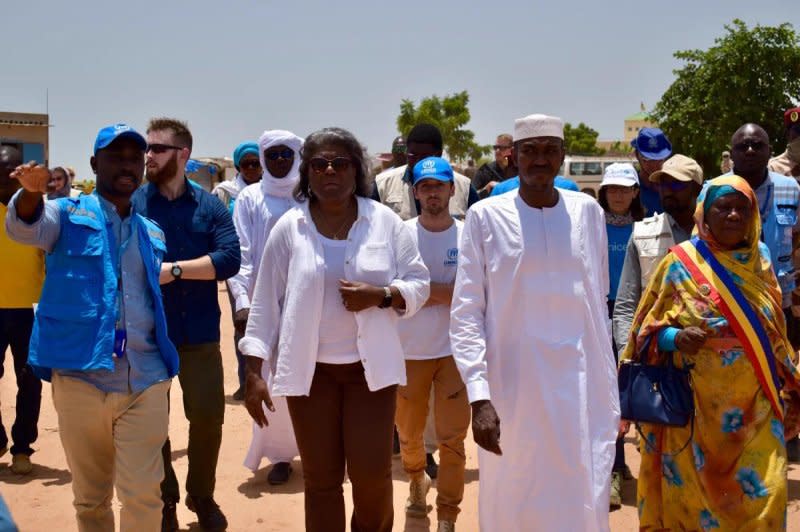U.S. ambassador to U.N. visits Chad to support humanitarian effort for Sudan, announces $163M in aid

Sept. 7 (UPI) -- A top U.S. official visiting a Chadian border town with Sudan, a country embroiled in in-fighting that has displaced millions, has announced more than $160 million in urgently needed humanitarian assistance for the citizens of the embattled North African nation, as well as punitive measures targeting those responsible for human rights abuses.
On Wednesday, U.S. Ambassador to the United Nations Linda Thomas-Greenfield was in Adré where she toured a hospital and visited a ward where Sudanese children were being treated for acute malnutrition. She visited a refugee camp and received a briefing from local officials and representatives from various U.N. agencies and NGOs.
And she's calling on the international community to do more to help the Sudanese affected by nearly 150 days of fighting that erupted April 15 between the Sudanese Armed Forces and its breakaway Rapid Support Forces paramilitary group.
"I will never forget the pain in the eyes of the Sudanese women I met during my tour of a refugee camp in Adré today," Thomas-Greenfield said on X, the social media platform formally known as Twitter. "I am determined as ever to share their stories with the world -- and to mobilize the international community to respond to this humanitarian dire crisis."
More than 60% of the 370,000 Sudanese refugees in eastern Chad are living in makeshift camps.
We must do more to bolster our partners' ability to relocate these men, women, and children to safe and dignified living quarters.— Ambassador Linda Thomas-Greenfield (@USAmbUN) September 6, 2023
For years, Sudan had teetered on the precipice of war following the ousting of the country's former three-decade dictator government of President Omar al-Bashir in a civilian-backed coup in 2019.
Amid its crawl toward democracy, Gen. Abdel Fattah al-Burhan, head of the SAF, and his deputy, RSF leader Abdelrahim Hamdan Dagalo, executed another coup but infighting over control of the government turned into bloodshed nearly five months ago.
Of the 7.1 million people internally displaced within Sudan, 3.8 million were thrust into the position due to the ongoing fighting, the U.N.'s International Organization For Migration said Tuesday in a statement that added 24.7 million people in the country are in need of humanitarian aid and protection.
On Monday, the U.N.'s refugee agency, along with 64 humanitarian and national civil society organizations, called on the international community to donate $1 billion to provide essential aid and protection to the more than 1.8 million Sudanese who are fleeing the conflict and are expected to arrive in five neighboring countries by the end of the year.
While visiting a food distribution site in Adré on Wednesday, Thomas-Greenfield announced nearly $163 million in assistance for the people of Sudan and neighboring countries, including Chad where many of the Sudanese refugees have fled.
The United States Agency for International Development said in a statement that it will provide $60 million of the committed funds with the remainder to come from the State Department.
According to Thomas-Greenfield, the new commitment brings the total U.S. humanitarian assistance for Sudan to nearly $710 million in fiscal year 2023.
She said the money announced Wednesday will provide food, water, sanitation, healthcare and other essentials that will help protect vulnerable people. It also includes support for communities hosting Sudanese refugees, she said.
She also said the Biden administration on Wednesday imposed punitive measures against two commanders of the RSF.
In a statement, the Treasury said it sanctioned Dagalo on accusations that his paramilitary group has committed human rights abuses, including massacring civilians, committing ethnic killings and employing sexual violence.
The State Department also used its power Wednesday to impose visa restrictions against Abdul Rahman Juma, an RSF general and sector commander of West Darfur where the paramilitary group is accused of committing grave crimes, including killing 87 people of the ethnic Masalit tribe whom they buried in mass graves.
In mid-June, Khamis Abdullah Abbakar, the governor of West Darfur, was brutally killed hours after accusing the RSF and its aligned Arab militias of having killed civilians in his state's capital of El Geneina. He had referred to the violence being committed in his state as "genocide."
The RSF denied responsibility but both the U.S.-supported Sudan Conflict Observatory and the United Nations mission to Sudan said the paramilitary was mostly likely to blame.
Secretary of State Antony Blinken said Wednesday that credible sources point to Juma's forces being behind Abbakar's kidnapping and death.
"We will not hesitate to use the tools at our disposal to hinder the ability of the RSF and Sudanese Armed Forces (SAF) to further prolong this war, and we will also use such tools to deter any actor from undermining the Sudanese people's aspiration for peace and civilian, democratic rule," Blinken said in a statement.
Linda-Thompson, in her speech and online, repeatedly said that she will return to the United States and do what she can to convince others not only to support humanitarian efforts in Sudan but to pressure those making war to end the conflict.
"When I return to New York, I will share what I learned -- and saw -- here in Adré with the Security Council. And I will push member states, and the entire U.N. system, to stand on the right side of history -- and to urge the Sudanese Armed Forces and the Rapid Support Forces to put down their weapons immediately," she said.

